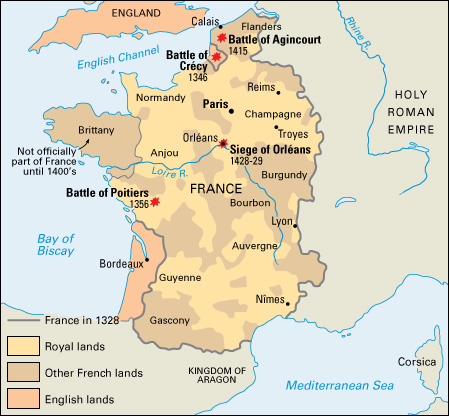Agincourt, << AZH ihn koor, >> Battle of, was one of the most important battles during the Hundred Years’ War (1337-1453) between England and France. It took place near the village of Agincourt—also spelled Azincourt—in northern France, on Oct. 25, 1415. It is one of the most famous victories in English history.

King Henry V of England renewed the Hundred Years’ War after a period of relative peace. In 1407, civil war broke out in France. Henry, who became king in 1413, saw an opportunity to make good on England’s claim to the French throne. In August 1415, he led an army across the English Channel and took the French seaport of Harfleur. He then pushed into northern France, where a French army confronted him near Agincourt.
The English army had only about 6,000 troops, but 5,000 of them were archers trained in the use of the longbow, the most advanced long-range weapon of the time. The archers were firmly disciplined and supported by cavalry. The French army was much larger, perhaps 20,000 to 30,000 strong. The main force of the French army consisted of nobles, knights, and heavily armed soldiers. The narrow field of battle allowed only a limited number of troops to fight at one time, removing France’s advantage in numbers. Also, the battlefield was wet and muddy, so horses and knights laden with heavy armor and weaponry moved with difficulty. French soldiers stacked up in the lines, making easy targets for archers and preventing the arrival of reinforcements. English arrows cut down the French soldiers by the hundreds.
The English won the battle, but they were still greatly outnumbered. Fearing further attack, Henry ordered the execution of most of the French prisoners taken during the fighting. In all, at least 6,000 French troops died, with English dead numbering fewer than 500.
Agincourt was the third great English victory in the Hundred Years’ War. The English went on to conquer Normandy and sign the Treaty of Troyes in 1420, making Henry heir to the French throne. The Battle of Agincourt is featured in the English playwright William Shakespeare‘s historical drama Henry V (1599).
